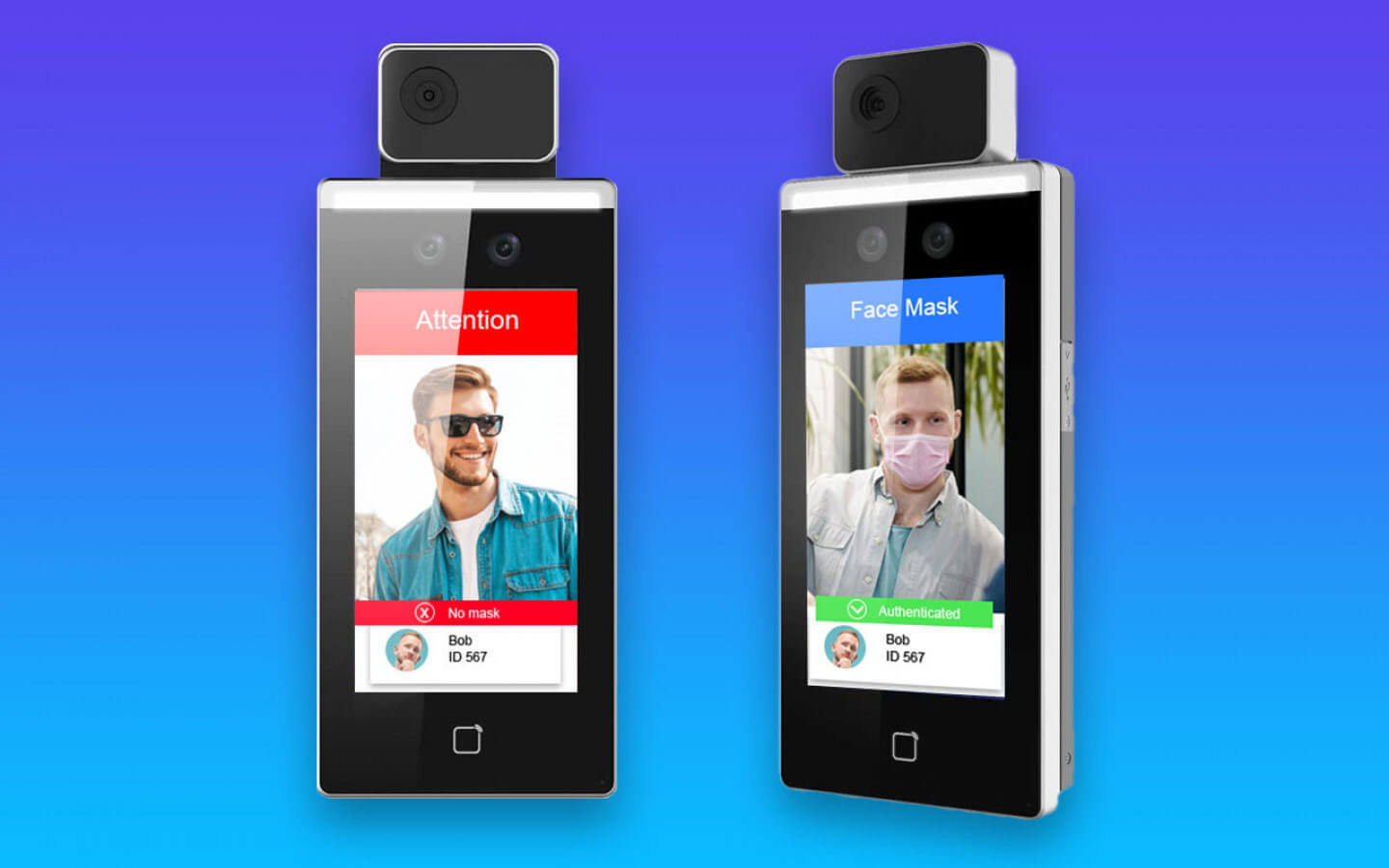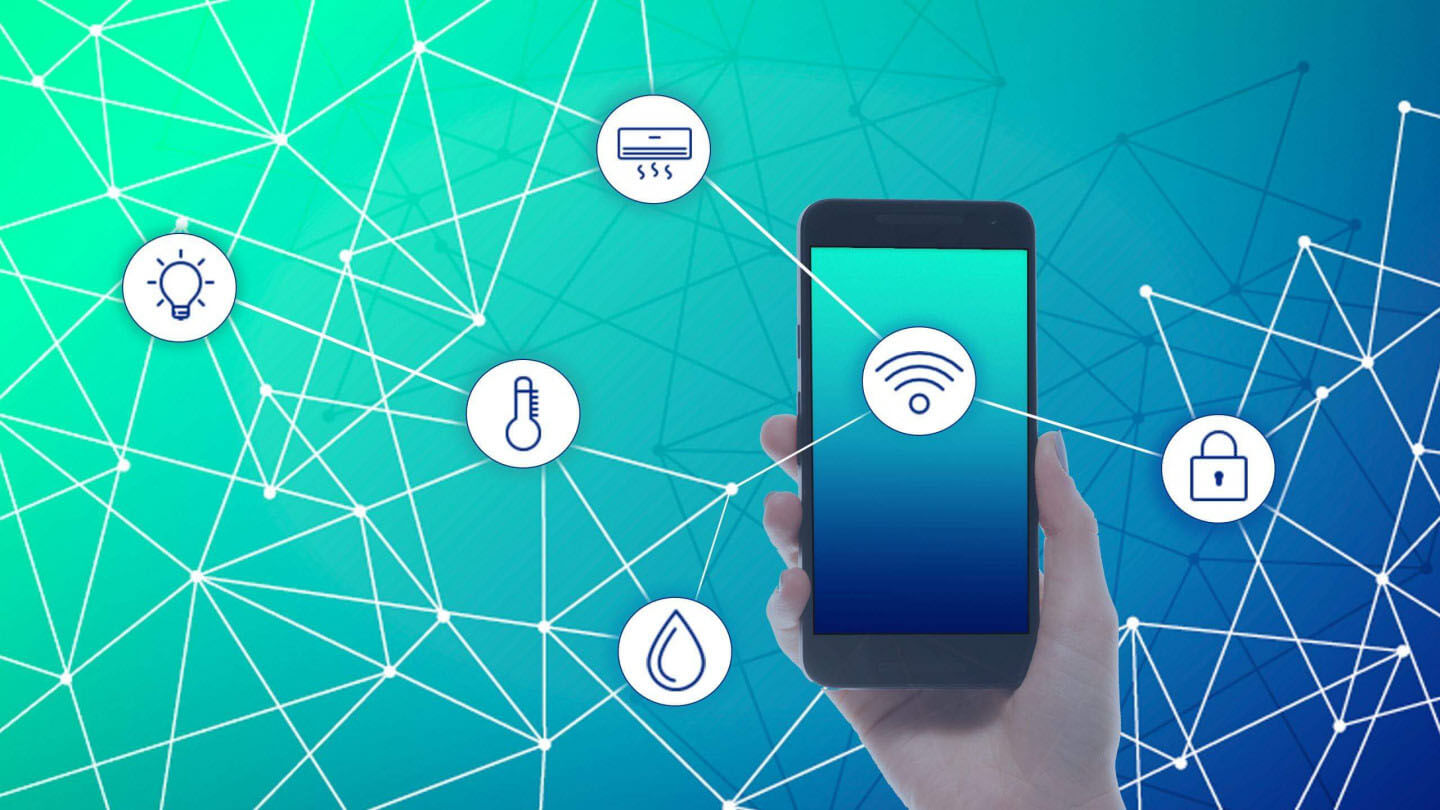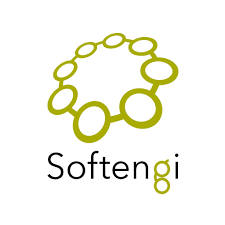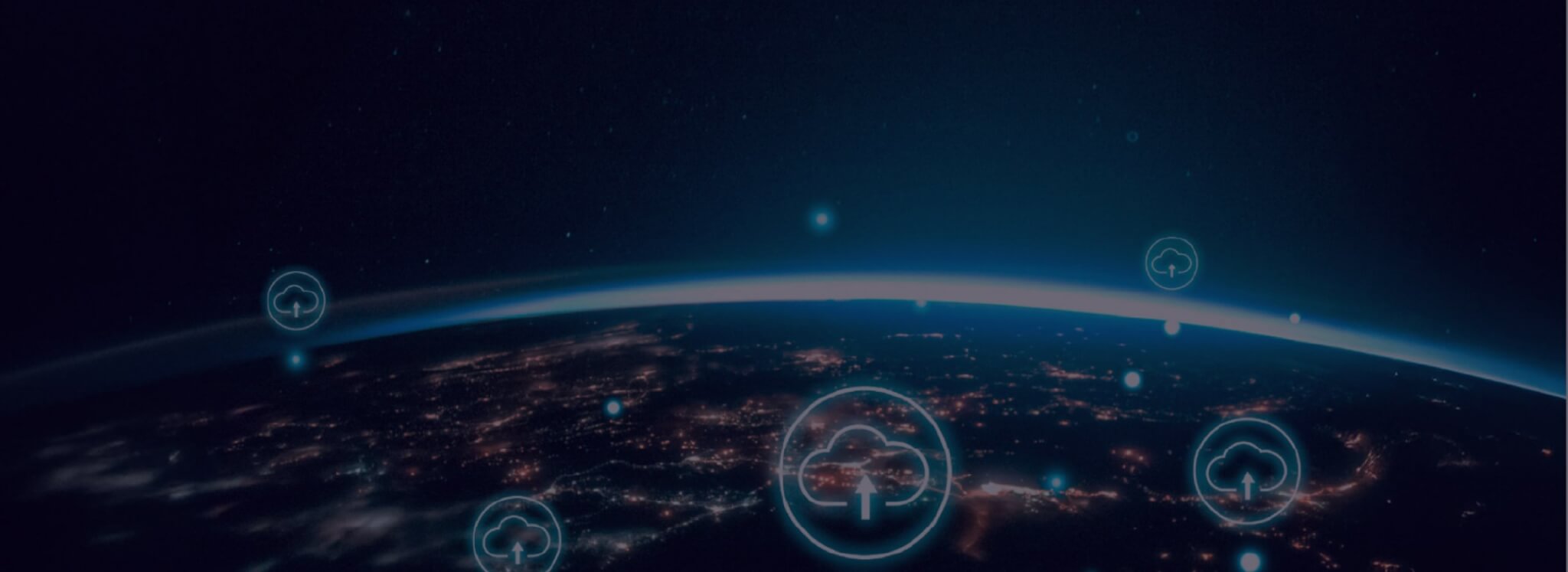The real estate industry confronts many challenges, such as volatility of the capital market, rising expenses due to private and public indebtedness, demand for affordable housing, the infrastructure crisis, and the coronavirus with the restrictions it caused.
The IoT for Real Estate technology reduces operational costs, improves the quality of life, and due to real-time surveillance, provides additional security. Moreover, IoT makes property management easier with building maintenance analytics. This article will explain such technologies and provide examples of smart real estate solutions.
Contents:
- Capturing Value from Real Estate Technology
- Challenges in the Real Estate and How IoT Real Estate Technology May Help
- Smart Real Estate Business Cases
- Summary
Smart Real Estate Case Study
Capturing Value from Smart Real Estate Technology
Internet of Things (IoT) is a cutting-edge technology that, with the help of IoT sensors, connects various physical objects located on real estate properties, providing users with an interconnected way to gather the information that allows them to automate various repetitive operations, detect potential equipment flows, and create a more cohesive and informed user experience.
“Especially in large sites, such as industrial zones, office parks, shopping malls, airports or seaports, IoT can help reduce the cost of energy, spatial management and building maintenance by up to 30 percent.”
Bettina Tratz-Ryan, research vice president at Gartner Inc
So what is Smart Real Estate? This term refers to a set of IoT-driven smart real estate solutions. At its core, such technologies operate based on real-time data, providing insight into the functional performance of a building and enhancing its tenants’ experience. The technology turns any physical object related to the building’s performance into a source of information. As a result, real estate companies significantly increase their revenues, decrease costs, and improve their asset utilization.
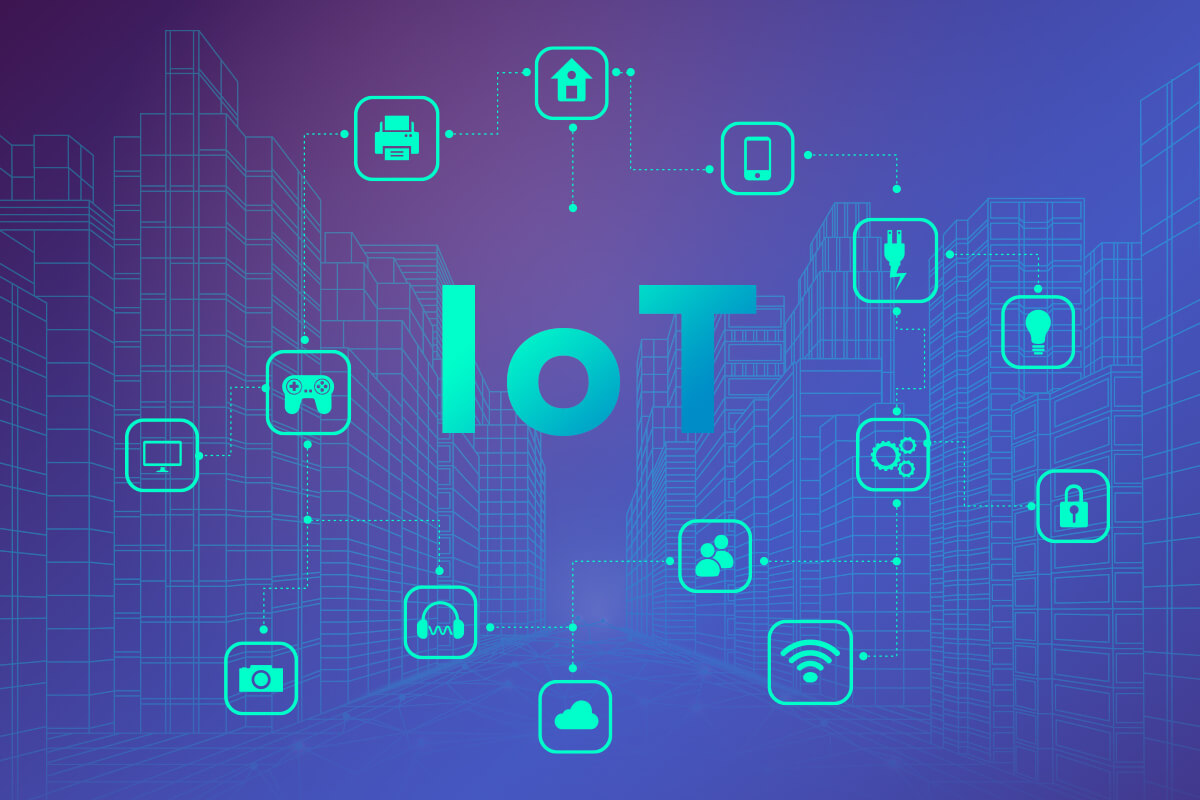
Challenges in the Real Estate Smart Solutions and How IoT May Help in Real Estate
“We’re seeing traditional strategies, technologies and business models change faster than companies can keep up because of this tremendous transformation brought about through the Internet of Things,” said Chris O’Connor, the general manager, Internet of Things for IBM. “Fortunately, the IoT revolution has also allowed us to give enterprises the ability to access and analyze data quickly and efficiently, creating meaningful insights that benefit business and society alike. Our goal is to harness this fundamental transformation to improve performance, optimize supply chains and enhance service delivery for our customers.”
IoT-driven real estate applications help to address several challenges that real estate companies are facing today:
- Covid-19 and the Limitations It Caused
- Affordable Housing
- Incident Management
- Environmental Impact
- Resource Consumption
- Weather-related Risks
- Sophisticated Customer Demands
- Crumbling Infrastructure
- Workflow Transformation
- Workplace Optimization
- Portfolio Risk Management
IoT for Covid-19 and the Limitations It Caused
Unexpected events, such as the current pandemic, bring many industries to a precarious state. Real Estate is not an exception. Social distancing has transformed the practiced ways of people’s interaction with physical spaces, and the initial effect of the virus outbreak has brought about the need to change the traditionally accepted business practices in the real estate sector.
To respond to the current threat of COVID-19, real estate companies are starting to embrace cutting-edge tech initiatives, one of which is IoT Real Estate technology.
IoT applications can assist in complying with Covid-posed restrictions by tracking whether social distance requirements and wearing masks are observed within real estate offices. IoT sensors also monitor and report the air quality inside the premises of real estate companies.
Affordable Housing
Another major challenge for real estate is affordable housing. According to CNBC, the housing shortage is enormous – the USA is short more than 5 million homes. With thousands of individuals under 40 struggling with debts and rising healthcare costs, even modestly priced real estate becomes less and less affordable. Due to customized energy management, IoT technology allows real estate companies to cut their costs on utilities. As a result, companies can provide better price offerings for tenants, generating more customers.
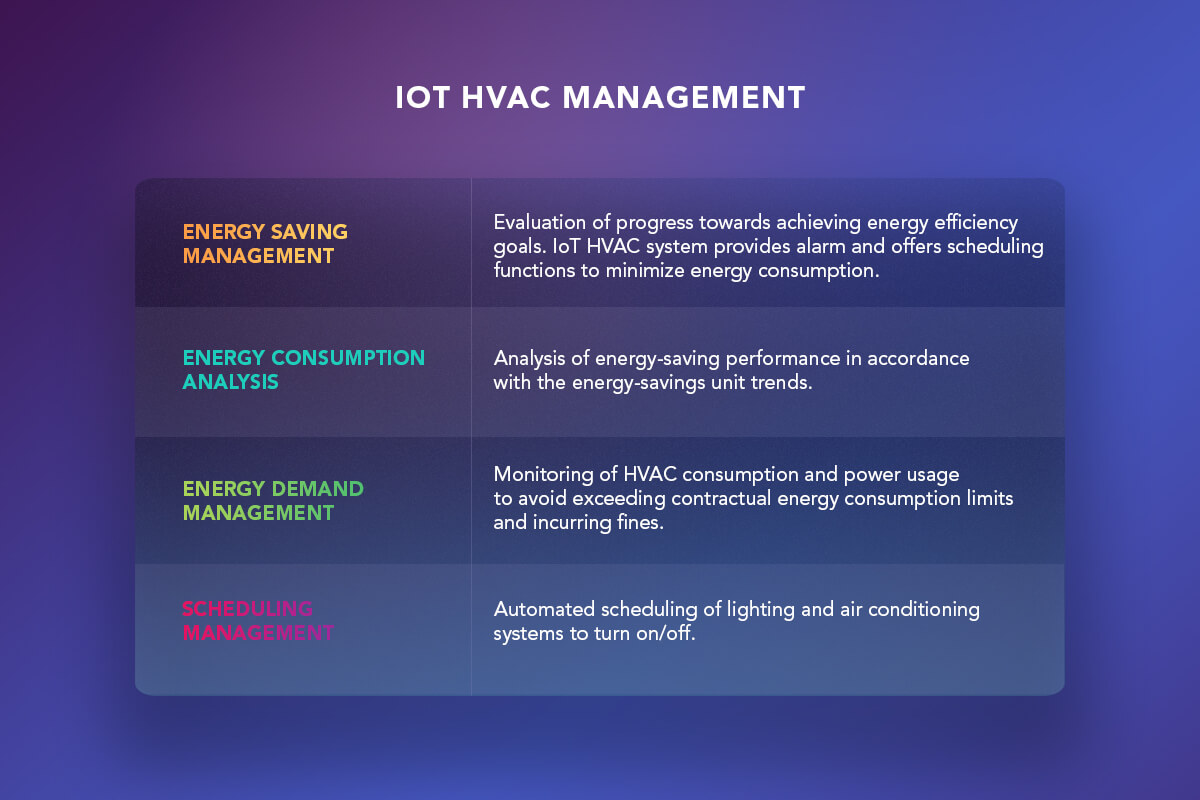
Computer monitoring of lighting and HVAC systems makes it easy for property managers of offices and large buildings to be preemptive of maintenance, ultimately saving on larger repair bills. These cost-saving measures attract major real estate investors and real estate investment trusts.
Incident Management
Property can suffer from various incidents, such as fires, floods, or burglary. Whether natural or human-caused, such incidents can severely damage property and threaten well-being.
Smart home technologies can help with the mitigation of incident-related risks. By monitoring buildings for abnormalities (for example, smoke or extreme pressure), IoT devices detect hazards in incipience. Smoke detectors can spot а fire early to prevent it from spreading; measuring pressure in pipes can point out a leak. Advanced monitoring functionality contributes to crime prevention. Summing up, the use of IoT makes incident management easier. And most importantly, IoT improves human safety.
Environmental Impact
For many buyers, eco-friendliness is one of the factors that influence their decision-making. There is a correlation between climate change concerns and the use of smart home technology. Among those concerned about climate change, 64% have a smart home device. In comparison, only 42% of those who aren’t that concerned use such technologies. So, eco-friendly property is demanded to be built and maintained with attention to the environment.
Heat, electricity, and water usage within the building determine its environmental impact. Therefore, optimizing property maintenance and resource consumption is vital for environmentally-conscious owners. Smart home technologies improve control over the use of water and energy. In other words, IoT-powered homes are more sustainable.
Resource Consumption
Rational resource consumption is a huge concern from both environmental and financial points of view. IoT-powered home systems can optimize the usage of resources. How exactly?
Smart meters gather data related to energy and water. This data allows automated home lighting, smart appliances, and other devices to adjust their work. For example, unnecessary lights will be turned off. Such measures prevent excessive resource consumption. Overall, smart home technologies can save up to 40% of energy.
Weather-Related Risks
IoT can be a game-changer for areas with an unstable climate and changeable weather conditions. The frequency and severity of hurricanes, tornadoes, and floods have greatly increased and have affected the value of disaster preparedness and resilience. Specialized weather sensors ensuring real-time monitoring can warn about adverse weather events in advance, keeping real estate managers and clients better aware of the potential threats to negotiated properties.
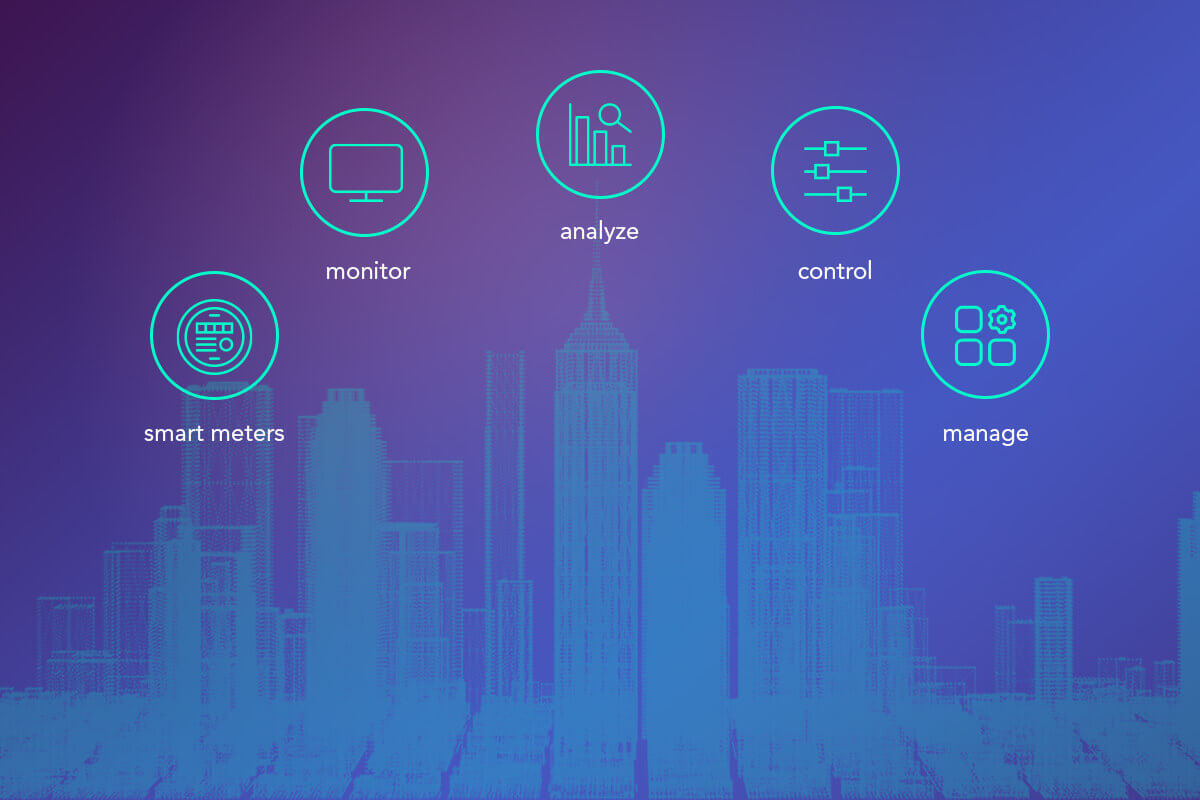
Sophisticated Customer Demands
Before the corona crisis, the real estate industry had rapidly progressed toward digitalization. However, the pandemic outbreak skyrocketed the whole segment pushing it towards digital transformation.
According to McKinsey, the business world has vaulted 5 years forward in consumer and business digital adoption in around eight weeks. As more companies adopt digital-first products and services, customer expectations and demand for more sophisticated solutions opportunities constantly grow.
IoT offers real estate executives several opportunities to engage customers and generate sales. From smart homes to IoT indoor navigation, IoT offers a wide suite of solutions for private households and the commercial sector.
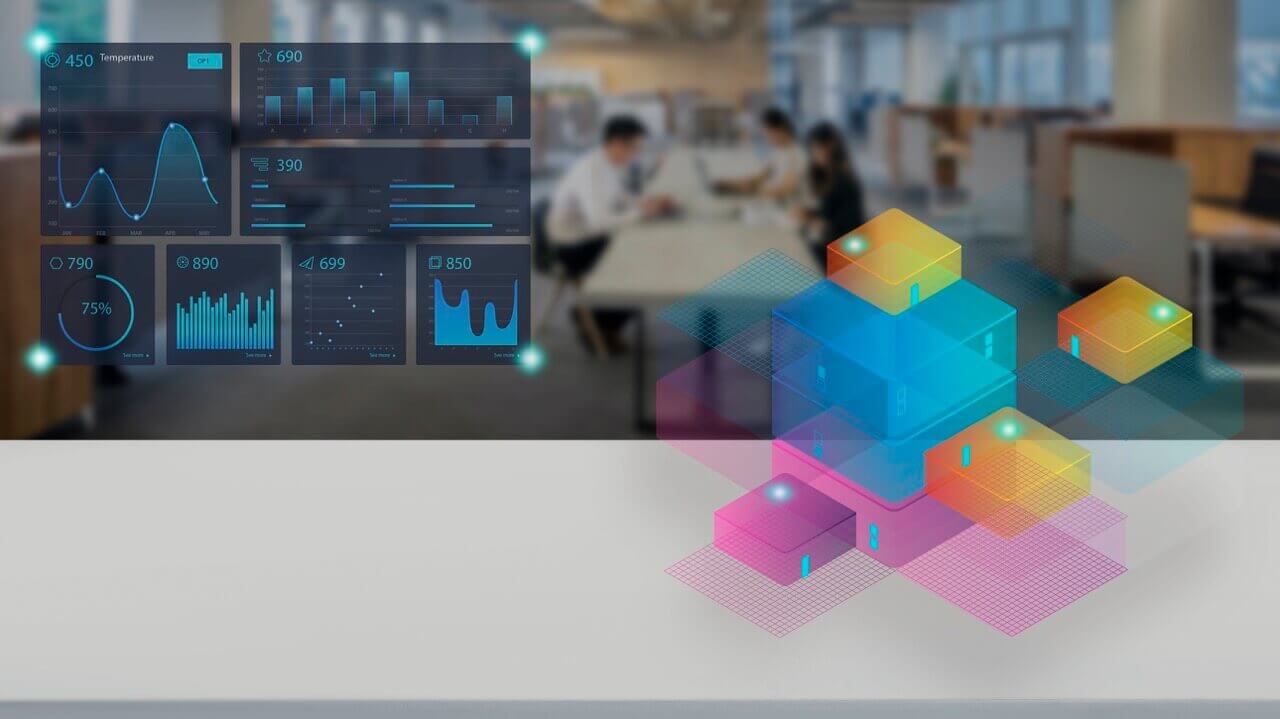
More and more real estate agencies embrace nontraditional approaches relying massively on virtual customer visits and strong online presence by providing IoT-supported advanced home-hunting. With IoT Real Estate applications, companies can attract potential clients by sending them promotional interactive messages that allow them to take a virtual walk inside the key location. Moreover, by applying the know-your-customer approach, real estate managers and executives gain valuable insight into customer needs and behavior.
IoT real estate applications provide potential customers with detailed information about the property, allowing them to formulate their queries without the involvement of realtors.
IoT Predictive Monitoring for Crumbling Infrastructure
According to APEX Commercial Group, everything from bridges to mass transit is in dire need of upgrades. The quality of infrastructure places an important role in the evaluation of the prospective property. With its condition monitoring and predictive analytics, IoT can identify if a building or any of its components or utilities needs a repair or an urgent update. Built-in IoT sensors can track any inconsistencies and send alerts to tenants or real estate managers. Potential buyers of such real estate properties will be more confident of their choice, knowing that their new homes are equipped with advanced technology to identify and resolve infrastructure flaws.
According to a Johnson Controls survey of the Building Efficiency Panel of Deloitte Financial Services, 70 percent of respondents suggest that the ability to predict and diagnose issues and provide solutions will be a “game changer.”
Workflow Transformation
The way most businesses operate is facing great change. For many companies, clients have migrated to digital, with their employees working fully remotely and becoming highly agile. To increase their workflow efficiency, many real estate agencies have launched analytics and high-tech initiatives in their operations.
By 2023, companies will invest in IoT up to $1.1 Trillion.
IoT Real Estate offers cutting-edge solutions to meet advancing challenges. With IoT, managers can track employees’ performance, create highly customizable workplaces, and automate redundant tasks.
Workplace Optimization
With the ability of IoT to analyze huge amounts of information in real-time, smart buildings system based on IoT technology has found use in office premises, as they allow to adjust and customize a workplace in accordance with current needs and requirements. For instance, an IoT buildings system can track the staff location and movements, identifying where employees spend most of their time throughout the day. As a result, the system will determine offices and locations that are not used efficiently and can be further rented.
Furthermore, IoT enhances workforce productivity by automating repetitive tasks such as swiping access cards, easily checking real-time occupancy of conference rooms, and tracking assets. For this purpose, Softengi has developed Smart Door Unlocking System, which allows unlocking doors by scanning four fingers with a mobile camera. By connecting a fingertip scanning system with hardware installed in the door, users can distantly control door locking and unlocking by presenting their fingers to the camera of their App.
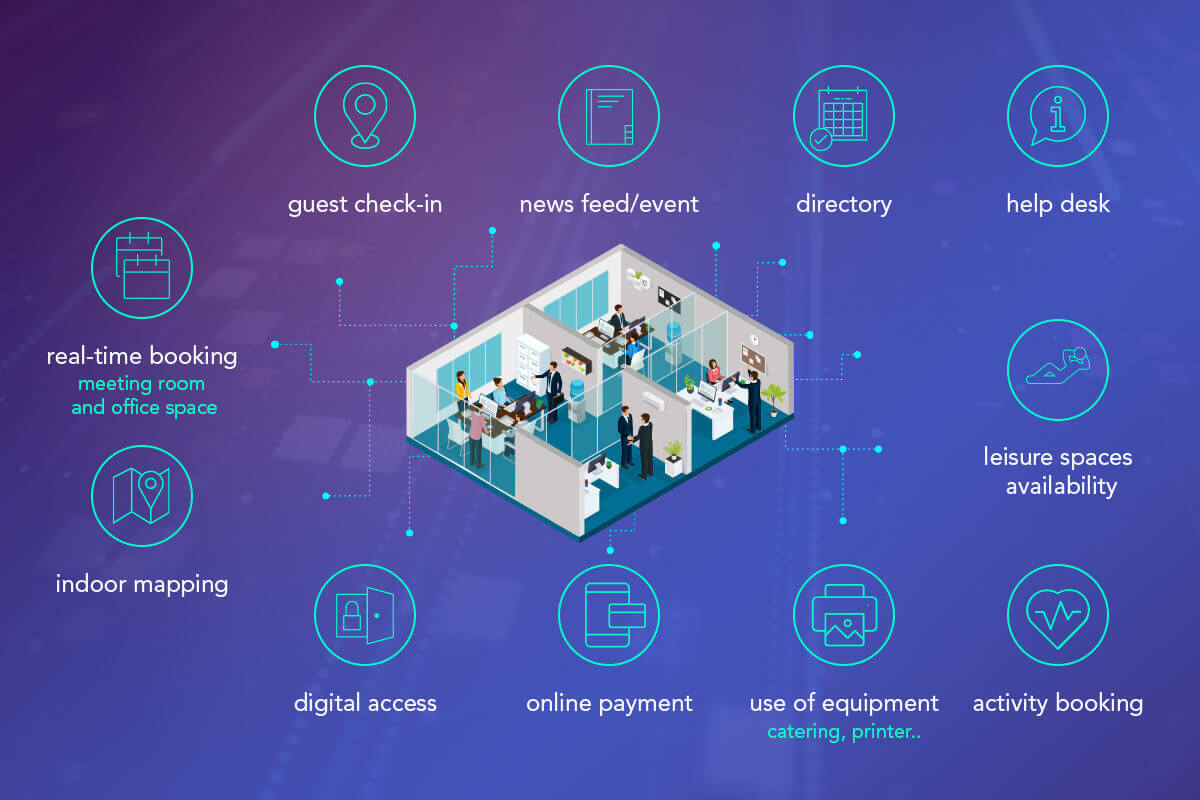
Portfolio Risk Management
The IoT Real Estate system leverages the home infrastructure by operating various management processes without manual involvement. At the portfolio level, IoT technologies enhance tracking and monitoring combined with portfolio analytics. The results are more granular valuations, lower asset risks, as well as augmented portfolio management capabilities. The IoT-driven Portfolio Risk Management can track the flow of people, enabling commercial real estate owners to analyze space usage patterns and occupants’ behavior. The gained information can help property managers to identify excess capacity and increase the efficiency of portfolio management.
Smart Property Real Estate: Business Cases
IoT in real estate varies depending on a specific property’s features and purpose. Some buildings require a way to optimize resource consumption, while others include a broad set of measures to enhance sustainability overall. Let’s look at smart home examples and the use of such technologies in office environments.
Aziot Digital Home
Softengi has developed Aziot, a Digital Home solution based on IoT technology. Softengi development team has created a connected digital platform that manages internal building management, from water leak prevention to security control. The platform controls all elements of the living environment: utilities, climate, ecology, safety, noise, and comfort. For instance, the IoT system can shut the water off in case of a leakage or automatically switch the power off if a tenant forgets to unplug the iron.
DA, an apartment complex that utilizes the Aziot solution, is an excellent example of IoT in real estate. More than 400 apartments within this complex have various IoT devices to provide better and more sustainable living conditions.
The solutions include smart meters and sensors. Smart meters optimize energy and water consumption. Smart sensors prevent potentially risky situations by monitoring smoke, leaks, temperature, and other characteristics. Apart from that, IoT provides improved visibility to ensure the safety and transparency of running the complex.
Smart Space Solution
Softengi has developed a smart space solution for workflow optimization, which allows to effectively collect valuable data about the workplace and workforce within a given space and visualize them with the help of web or mobile applications. The solution provides tracking staff and equipment location, identification of operational inefficiencies and alerts, as well as HVAC management. As a result, Softengi’s Smart Space Solution enhances workforce efficiency, workspace management, and workflow automation.
Softengi’s Office
We believe in the technologies we develop. That’s why Softengi’s office is equipped with IoT technologies such as IoT meters for responsible energy consumption. We also created a digital twin (a 3D model) of our office to get real-time data of office occupancy and usage. Here’s how it looks like:
We believe such technologies create more sustainable and productive office environments, which can also be applied to other workplaces.
Summary
There are various IoT-powered smart real estate solutions for all kinds of property. Resource management, workspace optimization, and risk management are among the most efficient use cases of IoT Real Estate. Thus, the demand for smart real estate services increases as well. Softengi offers the development of tailor-made IoT Real Estate software that meets specific challenges of your property. If you are unsure if IoT is the right technology for your business, let’s discuss it.



